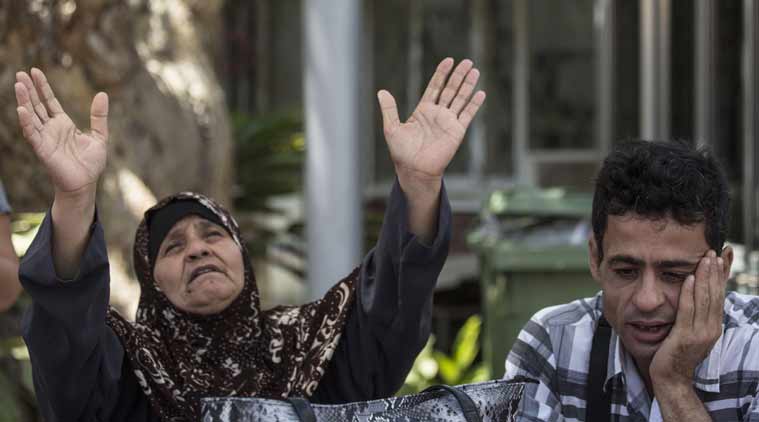Stay updated with the latest - Click here to follow us on Instagram
Palestinian ends fast after Israel suspended his detention
Allan began his fast to protest the Israel's policy of administrative detention, which allows authorities to hold suspects for months without charge or trial.
 Mazoza Allan , left, and Amid Allan, a brother of Mohammed Allan, a Palestinian prisoner on a hunger strike, wait outside Barzilai hospital in Ashkelon, southern, Israel, Wednesday, August 19, 2015. (Source: AP photo)
Mazoza Allan , left, and Amid Allan, a brother of Mohammed Allan, a Palestinian prisoner on a hunger strike, wait outside Barzilai hospital in Ashkelon, southern, Israel, Wednesday, August 19, 2015. (Source: AP photo)
A Palestinian prisoner held without charge in Israel ended his two-month-long hunger strike on Thursday, his lawyer said, a day after Israel’s Supreme Court suspended his detention.
The case of Mohammed Allan’s 66-day strike tested a new Israeli law allowing force-feeding, which has been criticized by many doctors who say the practice amounts to torture. It also cast light on Israel’s use of administrative detention, the holding of suspects for long periods without charge or trial.
[related-post]
Allan’s lawyer Jamil Khatib told reporters that his client ended his strike on Thursday and that his condition remained still serious but stable. It could take several weeks to know the full extent of the damage Allan sustained as a result of the prolonged fast, Khatib cautioned.
On Wednesday, Israel’s Supreme court suspended the detention order against Allan, releasing him while he receives medical care.
Earlier Thursday, Dr. Hezy Levy of Israel’s Barzilai hospital, where Allan slipped into unconsciousness last Friday, said the 31-year-old Palestinian was showing “great improvement.”
Allan regained consciousness on Monday and is said to have suffered brain damage as a result of his strike.
“We took him off the respirator. He’s no longer sedated,” Levy said. “He is starting to communicate and I am happy that medically he is on the right path.”
Levy said he hoped that Allan would soon start eating again on his own. Allan’s body cannot yet process food after such a prolonged fast.
Allan began his fast to protest the Israel’s policy of administrative detention, which allows authorities to hold suspects for months without charge or trial.
Israel defends the practice as a necessary tool to stop militant attacks and argues that revealing the charges would expose intelligence networks and put lives in danger. Rights groups say the measure violates due process, is meant only for extraordinary cases, and is overused.
Israel said the detention was applied to Allan for his affiliation with Islamic Jihad, a Palestinian militant group that has carried out scores of attacks on Israeli civilians and soldiers. Allan denies the affiliation.
Wednesday’s court decision means Allan will no longer be shackled to his bed and his family will be able to visit him in the hospital.



- 01
- 02
- 03
- 04
- 05




























